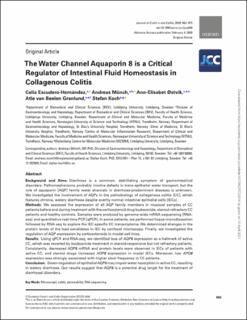| dc.contributor.author | Escudero-Hernandez, Celia | |
| dc.contributor.author | Münch, Andreas | |
| dc.contributor.author | Østvik, Ann Elisabet | |
| dc.contributor.author | Granlund, Atle van Beelen | |
| dc.contributor.author | Koch, Stefan | |
| dc.date.accessioned | 2021-05-10T12:40:31Z | |
| dc.date.available | 2021-05-10T12:40:31Z | |
| dc.date.created | 2020-08-14T15:09:15Z | |
| dc.date.issued | 2020 | |
| dc.identifier.citation | Journal of Crohn's and colitis. 2020, 14 (7), 962-973. | en_US |
| dc.identifier.issn | 1873-9946 | |
| dc.identifier.uri | https://hdl.handle.net/11250/2754702 | |
| dc.description.abstract | Background and Aims: Diarrhoea is a common, debilitating symptom of gastrointestinal disorders. Pathomechanisms probably involve defects in trans-epithelial water transport, but the role of aquaporin [AQP] family water channels in diarrhoea-predominant diseases is unknown. We investigated the involvement of AQPs in the pathobiology of collagenous colitis [CC], which features chronic, watery diarrhoea despite overtly normal intestinal epithelial cells [IECs]. Methods: We assessed the expression of all AQP family members in mucosal samples of CC patients before and during treatment with the corticosteroid drug budesonide, steroid-refractory CC patients and healthy controls. Samples were analysed by genome-wide mRNA sequencing [RNAseq] and quantitative real-time PCR [qPCR]. In some patients, we performed tissue microdissection followed by RNA-seq to explore the IEC-specific CC transcriptome. We determined changes in the protein levels of the lead candidates in IEC by confocal microscopy. Finally, we investigated the regulation of AQP expression by corticosteroids in model cell lines. Results: Using qPCR and RNA-seq, we identified loss of AQP8 expression as a hallmark of active CC, which was reverted by budesonide treatment in steroid-responsive but not refractory patients. Consistently, decreased AQP8 mRNA and protein levels were observed in IECs of patients with active CC, and steroid drugs increased AQP8 expression in model IECs. Moreover, low APQ8 expression was strongly associated with higher stool frequency in CC patients. Conclusion: Down-regulation of epithelial AQP8 may impair water resorption in active CC, resulting in watery diarrhoea. Our results suggest that AQP8 is a potential drug target for the treatment of diarrhoeal disorders. | en_US |
| dc.language.iso | eng | en_US |
| dc.publisher | Oxford University Press | en_US |
| dc.rights | Navngivelse-Ikkekommersiell 4.0 Internasjonal | * |
| dc.rights.uri | http://creativecommons.org/licenses/by-nc/4.0/deed.no | * |
| dc.title | The water channel aquaporin 8 is a critical regulator of intestinal fluid homeostasis in collagenous colitis | en_US |
| dc.type | Peer reviewed | en_US |
| dc.type | Journal article | en_US |
| dc.description.version | publishedVersion | en_US |
| dc.source.pagenumber | 962-973 | en_US |
| dc.source.volume | 14 | en_US |
| dc.source.journal | Journal of Crohn's and colitis | en_US |
| dc.source.issue | 7 | en_US |
| dc.identifier.doi | 10.1093/ecco-jcc/jjaa020 | |
| dc.identifier.cristin | 1823402 | |
| dc.relation.project | Norges forskningsråd: 262549 | en_US |
| dc.relation.project | Norges forskningsråd: 223255 | en_US |
| dc.relation.project | Samarbeidsorganet mellom Helse Midt-Norge og NTNU: 635854 | en_US |
| dc.description.localcode | © European Crohn’s and Colitis Organisation (ECCO) 2020. This is an Open Access article distributed under the terms of the Creative Commons Attribution Non-Commercial License (http://creativecommons.org/ licenses/by-nc/4.0/), which permits non-commercial re-use, distribution, and reproduction in any medium, provided the original work is properly cited. For commercial re-use, please contact journals.permissions@oup.com | en_US |
| cristin.ispublished | true | |
| cristin.fulltext | original | |
| cristin.qualitycode | 2 | |

